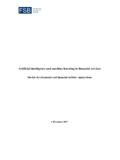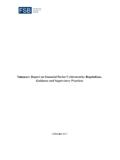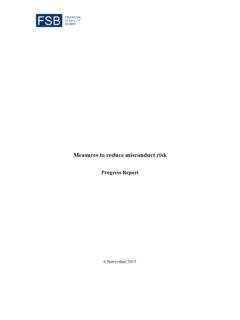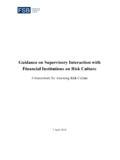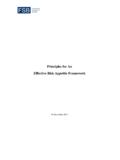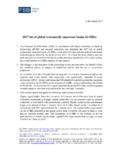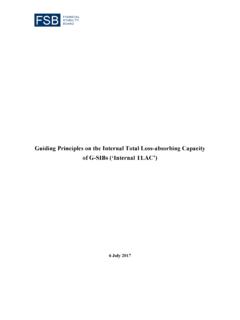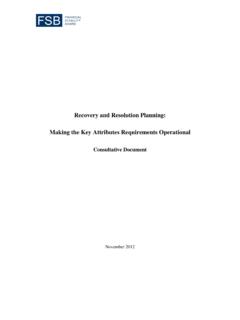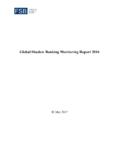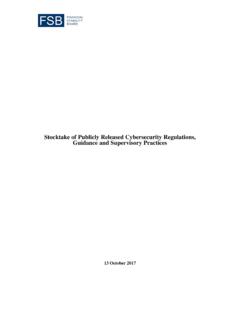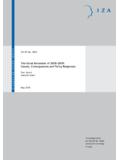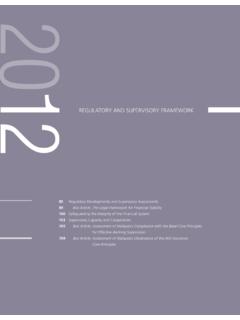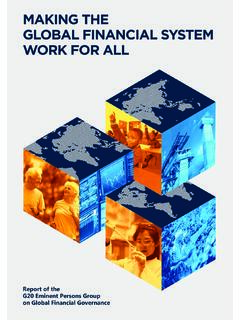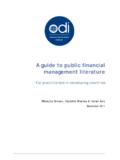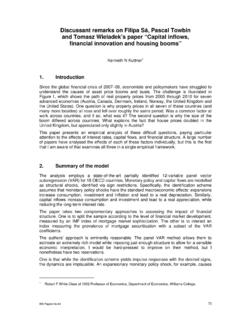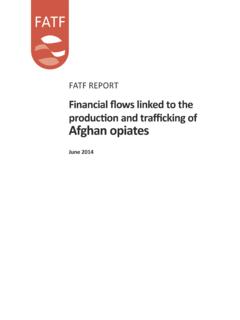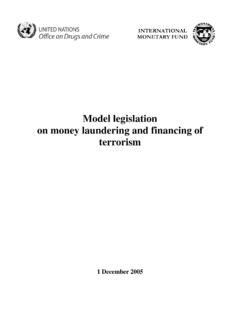Transcription of FSB work programme for 2019
1 12 February 2019 FSB work programme for 2019 The FSB s work priorities are designed to promote global financial stability. Vigilant monitoring to identify, assess and address new and emerging risks to financial stability lies at the heart of the FSB s activities and informs all of its other activities. Another key FSB activity will be evaluating the effectiveness and efficiency of reforms that have been implemented over the last decade to ensure that the intended benefits are being achieved, and taking action to address any unintended consequences.
2 This note summarises ongoing and planned initiatives in 2019 in these main areas of FSB Bullet points indicate main FSB publications scheduled for this year. Deliverables to the G20 during the 2019 Japanese Presidency are marked with an asterisk. The Annex Table provides an indicative timeline of the FSB publications planned for 2019. Addressing new and emerging vulnerabilities in the financial system Preserving financial stability, and thereby supporting sustainable growth, requires the continued monitoring of developments in the global financial system.
3 The FSB continues to scan the horizon to identify and assess emerging risks through regular discussion by its members of macro- financial developments, as well as through the biannual Early Warning Exercise conducted jointly with the International Monetary Fund (IMF). The FSB will also continue to assess the impact of evolving market structures and of technological innovation on global financial stability. This includes the resilience of financial markets in stress, the implications of the growth of non-bank financial intermediation and operational issues such as cyber risks.
4 Assessment of vulnerabilities. The FSB Plenary will continue to assess vulnerabilities in the global financial system on a regular basis, with a continued focus on the financial stability implications of rising interest rates against the backdrop of elevated debt levels. The assessments will be informed by the work of the Standing Committee on the Assessment of Vulnerabilities (SCAV). FinTech. The digitalisation of finance has the potential to significantly change the current functioning of the global financial system, which raises a number of possible benefits and risks.
5 The FSB will continue to monitor digitalisation trends, to assist in harnessing the benefits while mitigating risks. This includes the regular monitoring of the financial stability implications of 1 Information on the FSB s key activities during the past year is provided in the 2017/18 Annual Report. The fourth annual report on the implementation and effects of the G20 financial regulatory reforms, published in November 2018, discusses the progress made in the reform agenda as the FSB pivots towards implementation and rigorous evaluation.
6 RES 2 crypto-assets and a discussion of supervisory and regulatory approaches to crypto-assets and potential regulatory gaps in this area. Moreover, the FSB s financial Innovation Network will further analyse the financial stability implications of technological innovation, such as the entry of large technology firms into finance and third-party dependencies from technology, as well as the financial stability implications of decentralised financial technologies. Report on FinTech and market structure in financial services Directory of crypto-asset regulators, which lists the regulator(s) responsible for each aspect of crypto-asset regulation* Report on the financial stability implications of decentralised financial technologies* Cyber resilience.
7 In the digital age, cyber incidents are one potential threat to the financial system. The FSB will contribute to work to enhance cyber resilience. Building on the 2017 stocktake of regulatory and supervisory cyber security practices, the Standing Committee on Supervisory and Regulatory Cooperation (SRC) will work to identify, assess and report on best practices relating to a financial institution s response to, and recovery from, a cyber incident. SCAV will continue to analyse the systemic consequences of operational and cyber incidents.
8 Progress report on the development of effective practices for cyber incident response and recovery* Non-bank financial intermediation. The shift toward non-bank financing represents a welcome increase in diversity of the sources of finance supporting economic activity and is therefore in line with the G20 reform objectives, provided that such financing is resilient. The FSB continues to monitor and assess the growth of non-bank financing and risks in this area through its annual Global Non-Bank financial Intermediation Monitoring Report.
9 Annual Global Monitoring Report on Non-Bank financial Intermediation Accounting and audit. The FSB continues to encourage consistent application and auditing of accounting standards and enhanced audit quality. Building on previous dialogues, the 2019 Roundtable on External Audit will continue to provide a dedicated platform for public authorities and audit regulators to discuss the implications of existing audit market structures, and to exchange views with the major global accounting networks on issues that are of significance to audit quality.
10 Finalising and operationalising post-crisis reforms G20 post-crisis financial reforms have delivered a safer, simpler and fairer financial system. To reinforce this progress, the FSB is working with standard-setting bodies (SSBs) to complete work on a few final issues in the main reform areas: Building resilient financial institutions. Following the finalisation of Basel III in December 2017, remaining policy work in this area concerns the insurance sector. The International Association of Insurance Supervisors (IAIS) will finalise the Insurance Capital Standard (ICS) for the five-year monitoring period and the Common Framework for the Supervision of Internationally Active Insurance Groups ( ComFrame).
